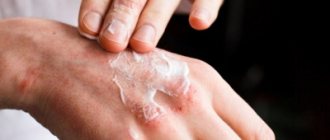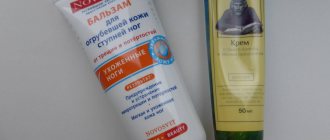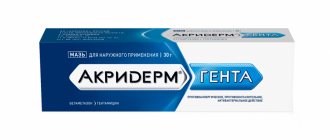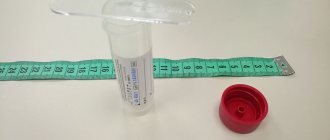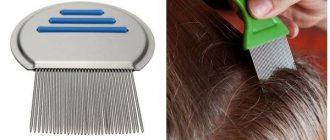April 27, 2020
Regular treatment with ointment is one of the mandatory methods of treating psoriasis on the arms, legs, face and other parts of the body. The oily texture of such external products allows the active ingredients to remain on the skin for a long time, which makes them more effective than creams and gels.
The list of ointments for psoriasis includes two main types of products:
- Hormonal. They can bring good results, but have many side effects.
- Non-hormonal. Less effective, but safer compared to hormonal ones.
The role of skin care during illness
With psoriasis, accelerated renewal of the upper layer of skin is observed. Normally, epidermal cells form within 3-4 weeks, but in case of illness this process is reduced to 4-7 days[2]. As a result, the skin loses elasticity and becomes dry and sensitive. Characteristic psoriatic plaques appear on the surface of the body. A person is bothered by itching in the affected areas.
Proper skin care helps:
- eliminate discomfort - relieve itching, burning;
- protect the skin from the addition of a secondary infection that provokes complications;
- accelerate the healing of plaques;
- soothe irritated skin.
Tar ointments and hydrantrons
For many years, tar preparations have been used for external treatment of psoriasis, especially in combination with ultraviolet irradiation, baths and insolation. Today, ointments based on wood and coal tar are indicated for the treatment of the disease. The latter is considered more active and effective in the treatment of psoriasis, but has carcinogenic properties. No less common medications are hydrantrons. These ointments were created in the early twentieth century from the natural product chrysarobin, which was a mixture of anthracene derivatives obtained from the trunks of the Vonacopua Araroba tree. Today, synthetic hydroxyanthrones are used - dithranol and cignolin, anthralin, and anthrobine, which are similar in chemical composition.
Dithranol is a synthetic analogue of chrysarobin. This medication has a powerful cytotoxic and cytostatic effect, which provokes a decrease in the activity of glycolytic and oxidative processes in epidermal cells. As a result, the number of mitoses in the epidermis gradually decreases. However, it is worth considering that dithranol can cause a series of side effects. For example, it has an irritating effect, so if it gets into the eyes, keratitis can develop. Patients with psoriasis who use this ointment may experience irritation, itching and hyperemia on the skin.
An alternative to this drug are cygnoderm, ditrastik, psorax. The first two are produced in the form of a small rod that looks like lipstick. Thanks to the convenient form and the addition of paraffin, it is possible to achieve the most accurate application of the active substance of the drug, so it is convenient to use for treating limited lesions of psoriasis. Less commonly, patients are prescribed ointments that contain analogues of mustard gas.
Hygiene rules for psoriasis
You can't do without regular cleansing. Water treatments help get rid of external impurities and excess sebum. On the other hand, prolonged contact with water during the acute phase can worsen the skin condition. The plaques become soft, grow, and their area increases[3].
To avoid worsening, you should refrain from taking a bath and spend no more than 5-10 minutes in the shower. The water temperature should be average - no higher than 37-38 degrees. Hard sponges cannot be used. Mechanical impact can injure the skin, which leads to the appearance of new lesions.
Particular attention is paid to the choice of detergents. Key criteria:
- neutral pH level;
- no fragrance;
- homogeneous texture without abrasive particles;
- minimal amount (or complete absence)
Do not rub your skin after a shower. Such tactics will only increase irritation. It is better to gently blot areas with plaques with a soft towel.
With psoriasis, it is extremely important to keep your hands clean to protect yourself from introducing pathogenic bacteria to the affected skin. To avoid scratching, it is better to cut your nails short. If the plate itself is damaged, you should stop polishing or applying varnish.
Coal tar
An effective method of external therapy for psoriasis is the use of coal tar. Typically, coal tar is combined with other topical medications (such as steroids) or with UV irradiation. However, it must be remembered that prolonged use of coal tar can increase the sensitivity of the skin to ultraviolet rays. Therefore, to prevent severe skin burns, the combination of this drug with UV therapy should be used extremely carefully to treat psoriasis.
Skin care cosmetics
- Moisturizing. Such products protect the skin from excessive dryness, fight flaking and a feeling of tightness, and restore comfort. For psoriasis, you can use emollients - special pharmaceutical products with a complex effect. They deliver water to the deep layers of the skin, restore the lipid barrier and promote damage healing.
- Exfoliating (keratolytics). These products soften plaques and promote healthy skin. The composition may include urea, lactic acid, salicylic acid.
For psoriasis, it is useful to use skincare products containing vitamin D3[4]. This substance helps suppress inflammation and strengthen the skin barrier. Another form, vitamin D2, is synthesized inside the body under the influence of UV rays. The compound also accelerates healing, so experts recommend taking short (no more than 15-20 minutes) sunbathing for psoriasis. Despite the benefits of tanning, you should not ignore products with an SPF filter. They protect sensitive skin from burns, which in psoriasis are no less dangerous than mechanical damage.
Oral retinoids
Drugs of the retinoid family, which are recommended for complicated forms of psoriasis, are associated with vitamin A. Soriatan is considered one of the effective drugs in this group. It is prescribed for the treatment of severe forms of the disease, especially its erythrodermic and pustular forms, which do not respond to other types of therapy. However, it is worth considering that taking this drug may be accompanied by serious complications. For example, it is prohibited for pregnant women, since after taking it the risk of congenital pathologies of the fetus increases significantly.
Compared to another drug from the retinoid group, tegison, soriatane is eliminated from the body much faster. However, it is advisable for women who have undergone treatment with soriatan to avoid pregnancy for three years after completion. They are also strictly prohibited from drinking alcohol for two months after finishing taking soriatane, since alcohol promotes its conversion in the bloodstream to tegison. This can cause birth defects in the baby, even if a long time has passed since the medicine was taken. In rare cases, soriatane is replaced with a less effective but gentler drug called isotretinoin. The appropriateness of taking a particular medication is assessed by a qualified doctor based on a comprehensive diagnosis of the patient and a series of laboratory tests.
Medicines for psoriasis
You cannot get rid of the disease, but its course can be controlled. External medications[5] will help with this. Therapeutic creams and ointments relieve itching, trigger epidermal regeneration, and suppress inflammation. Experts recommend the use of complex-action drugs containing several active components at once [6].
A universal assistant for psoriasis - Akriderm SK. It contains two components: betamethasone and salicylic acid[7]. This composition provides a comprehensive effect. The product penetrates to the source of inflammation, promotes the healing of psoriatic plaques and eliminates the symptoms of psoriasis - itching, burning, redness, swelling. It helps fight pathogenic flora on the surface of the skin, which can help reduce the risk of relapse and secondary infection. This is how it differs from monocomponent analogues. In addition, the drug is well tolerated and causes virtually no side effects [8].
An exacerbation of psoriasis is accompanied by discomfort, but unpleasant symptoms can be avoided if you carefully care for your skin during periods of remission. It is important to avoid mechanical damage, protect yourself from sunburn, regularly use moisturizers, and in case of relapses, use topical medications prescribed by a specialist.
Cyclosporine
Cyclosporin A is a waste product of the fungus Jolypocladium infantum Gams, which is a cyclic polypeptide consisting of eleven amino acid residues. In medicine, the drug is used as an immunosuppressant, especially for organ transplantation and the treatment of dermatoses (hyperproliferative, allergic, bullous, malignant). The therapeutic effectiveness of the drug is based on its effect on human immunity, since it is able to inhibit T-lymphocytes and suppress the active production of IL-2. Cyclosporine is prescribed for widespread, severe and resistant skin lesions.
For patients with severe psoriasis, another form of cyclosporine, Neoral, may also be recommended. However, this drug is not suitable for all patients. The drug is suitable only for adults who have extensive skin damage that has led to disability. Neoral is also prescribed to patients with psoriasis who do not respond to other systemic medications (acitretin or methotrexate) or who have contraindications to them. The active ingredients of the drug suppress immune activity, thereby slowing down the rapid turnover of skin cells and reducing the number of inflammatory cells.
Treatment methods
When selecting remedies for psoriasis, the doctor assesses the condition of the skin affected by plaques. Usually the scalp, neck, elbows, and knees are affected. Less commonly, rashes affect other parts of the body.
Treatment must be comprehensive; it includes the use of medications, both internally and externally, diet, physical therapy and other doctor’s recommendations.
Which doctor prescribes treatment?
To prescribe the most effective treatments for psoriasis, the patient may need to consult several specialists. Typically, the patient first contacts a dermatologist who conducts an initial examination. It is not difficult to recognize psoriasis, since the plaques have a specific shape and differ from the manifestations of other skin ailments.
In order to select the most appropriate therapy, a dermatologist can prescribe a consultation with an endocrinologist, psychotherapist, gastroenterologist, and other specialists. Once you have a complete picture of a person’s health, you can choose the most effective remedies for psoriasis.
Top 10. Daivonex 0.005% 30 g
Rating (2021): 3.93
14 reviews from resources were taken into account: Reviewer
A drug based on a synthetic analogue of vitamin D3. The product acts on psoriatic plaques in the same way as sun rays. Painful areas dry out and peel off, gradually disappearing. The drug is suitable for long-term use.
- Characteristics
Country: Ireland
- Average price: 1198 rub.
- Type: non-hormonal D-vitamin-like product
- Active ingredients: calcipotriol
- Age restrictions: from 6 years
Non-hormonal ointment with delayed effect. To obtain a visible result, you need to use the product for 2 courses of 6-8 weeks with breaks of 2-3 weeks. The exact duration of treatment is determined by the doctor. The drug is applied 2 times a day only to damaged skin; it is recommended to remove excess from healthy areas. Judging by the reviews, the ointment helps even in advanced cases. However, to obtain stable remission, it must be used in conjunction with other means. And the first results are visible only after 1-2 weeks from the start of treatment. And for some, the composition does not help at all - hence the low rating of Daivonex. In order not to be disappointed in the effectiveness of the product and not to waste money, it is better to undergo an examination by a doctor before using the ointment.
Advantages and disadvantages
- In complex treatment helps to achieve long-term remission
- Dries and exfoliates psoriatic plaques
- Reduces the number of lesions on the skin of the body
- Very expensive
- Requires long-term use
Prescribed drugs
All medications for psoriasis are divided into two groups: hormonal and non-hormonal. The first includes corticosteroids. Their advantage is that the desired effect is achieved quickly. Thanks to the powerful action of corticosteroids, the inflammatory process subsides, peeling and itching are eliminated. However, there is a possibility of a rapid return of symptoms, especially if external therapy is abruptly discontinued. And you can’t use hormonal drugs for a long time.
Therefore, treatment necessarily includes non-hormonal ointments, creams, lotions and gels for psoriasis as further maintenance therapy. These can be products based on zinc, an analogue of vitamin D3, naphthalan and others.
Table 1. Factors influencing the choice of drugs for the treatment of psoriasis
| Objective factors | Subjective factors |
| Form of psoriasis | |
| Disease stage | |
| Prevalence of lesion | Features of the psyche |
| Patient motivation | |
| Past treatment experience |
Table 2. “Hormonal ointments” for psoriasis by strength of activity[1]
| Class (Activity) | INN | Trade name, Manufacturer | INN | Trade name |
| one-component | multi-component | |||
| 4th grade (very strong) | Clobetasol propionate 0.05% | Dermovate, GSK (ointment, cream) | — | |
| Etrivex, Galderma (shampoo) | ||||
| Klovate, Elfa (ointment, cream) | ||||
| Powercourt, Glenmark (cream) | ||||
| Grade 3 (pronounced) | Betamethasone valerate 0.1% | Akriderm, Akrikhin (cream, ointment) | betamethasone+gentamicin | Akriderm Genta, Akrikhin |
| Betameazone dipropionate 0.025%,0.05% | Beloderm, Belupo (ointment, cream, express spray), | Celestoderm-B, MSD | ||
| Celestoderm-B, Bayer (ointment, cream) | betamethasone+gentamicin+clotrimazole | Akriderm GK, Akrikhin | ||
| Triderm, Bayer | ||||
| betamethasone+gentamicin+salicylic acid | Akriderm SK, Akrikhin | |||
| Triderm, Bayer | ||||
| betamethasone + salicylic acid | Belosalik, Belupo | |||
| Diprosalik, Bayer | ||||
| Rederm, Vertex | ||||
| Hydrocortisone butyrate | Laticort, Elfa (ointment, cream, lotion) | — | ||
| Lokoid, Astellas (ointment, cream, lotion) | ||||
| Mometasone | Elokom, Schering Plow (ointment, cream, lotion) | mometasone + salicylic acid | Elocom-S, Schering Plow | |
| Silcaren, Vertex (cream) | ||||
| Triamcinolone | Triakort, Akrikhin (ointment) | — | ||
| Fluorocort, Gedeon Richter (ointment) | ||||
| Fluocinolone acetonide | Sinaflan, Nizhpharm, (liniment), | fluocionol acetonide + neomycin | Flucinar N, Elfa | |
| Sinoderm (ointment, cream, gel), | ||||
| Flucinar, Elfa (ointment, gel) | ||||
| Fluticasone | Cutivate, GSK (ointment, cream) | — | ||
| 2nd grade (secondary) | Alclomethasone | Afloderm, Belupo (ointment, cream) | Hydrocortisone acetate + oxytetracycline | Oxycort, Polfa |
| 1st class (weak) | Hydrocortisone acetate | Hydrocortisone, Elfa, etc. (ointment) | Hydrocortisone acetate + fusidic acid | Fucidin G, Leo |
| Prednisolone | Prednisolone (ointment), Altaivitamins | Hydrocortisone+natamycin+neomycin | Pimafucort, Astellas |


